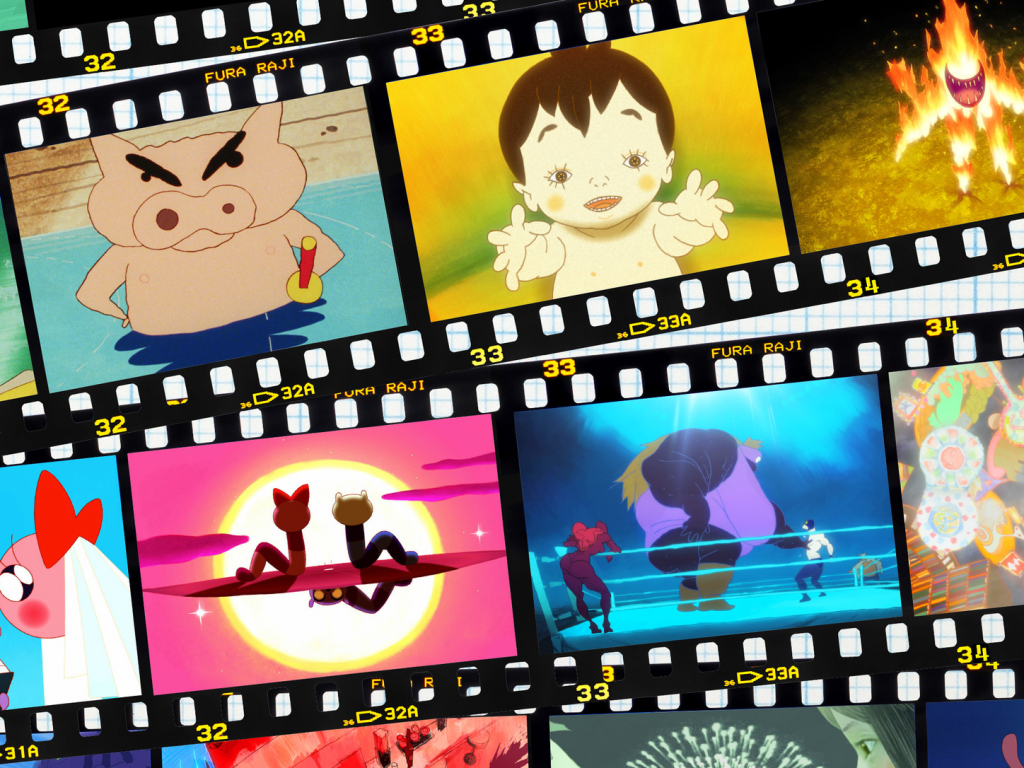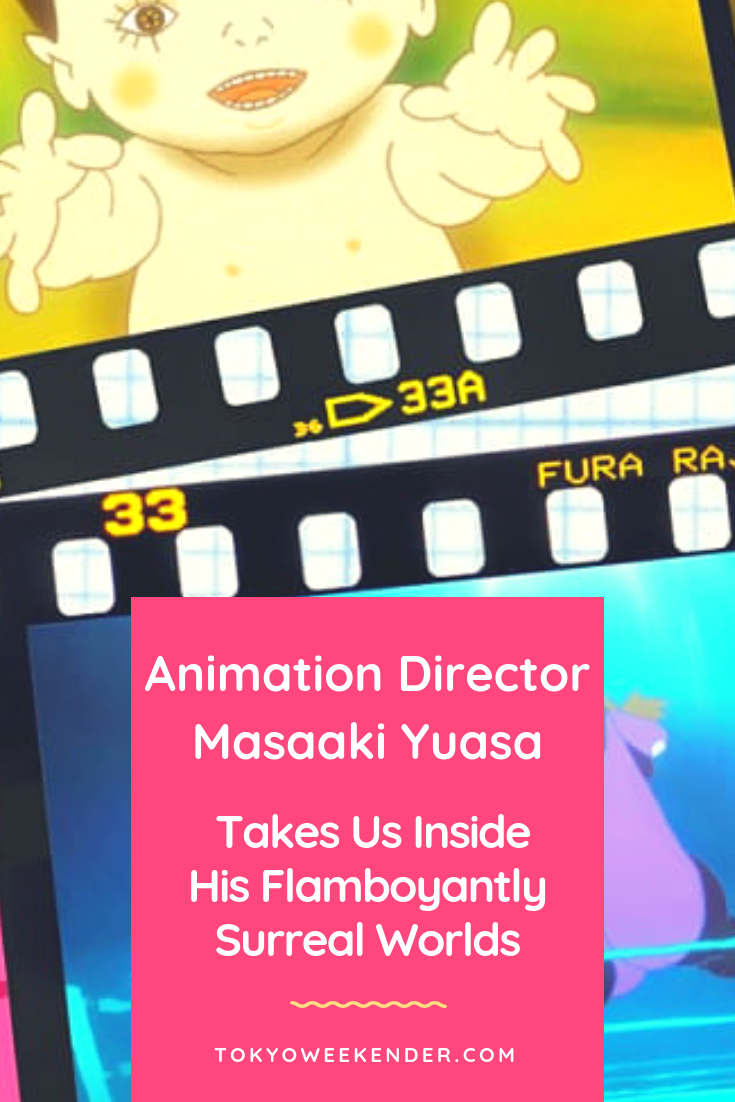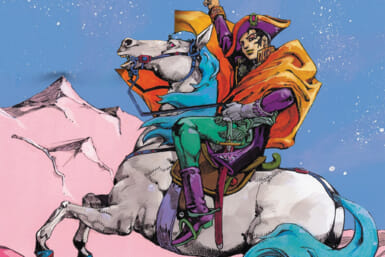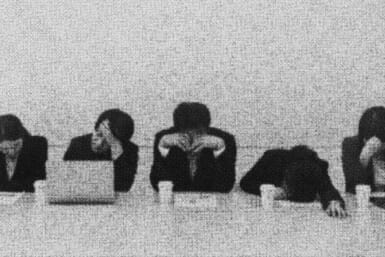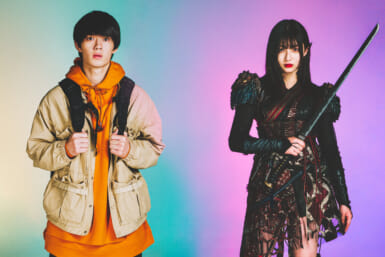As a young artist, Masaaki Yuasa was mesmerized by the climactic scene from the 1981 film The Fox and the Hound in which the red fox battles the black bear like a whirling dervish grappling through brush, across streams and over a cliff’s edge.
The scene was the protruding nail of an otherwise formulaic film as legendary Disney animator Glen Keane used cutting edge metamorphose techniques to blend one frame to the next, exhibiting fluid, gripping action. Yuasa analyzed the scene frame-by-frame, fascinated by the technique unheard of in Japan at the time.
During his formative years, Yuasa studied Disney’s Golden Age films, the works of Hayao Miyazaki and French animator Paul Grimault’s masterpiece The King and the Mockingbird, each renowned for meticulous detail in each frame.
It was Ajia-do studio co-founder Osamu Kobayashi, where Yuasa held his first job, who told Yuasa that he could not consider himself a master of animation unless he could insert abstract frames, like those in The Fox and the Hound, into his own films.
“I fully agree with him,” says Yuasa, who was also inspired by The Beatles’ psychedelic animated film, Yellow Submarine. “I found it interesting that while those frames were not recognizable, they were still giving impact, and influencing the viewer.”
In a recent interview, Kobayashi called Yuasa’s wild, freeform style “very distinct.” The virtuoso’s experimental style mixes exaggerated expressions and movement, manipulation of perspective and frenetic pacing that reflect his international influence and defy Japanese anime stereotypes.
Film critic Emily Yoshida calls Yuasa “one of the most exciting, multitalented, and prolific creators working in animation right now.”

The Night Is Short, Walk on Girl, 2017
Within the past year, Yuasa’s 15-year career culminated with the release of two feature films and the original Netflix anime series Devilman Crybaby while also earning top prize at two international film festivals, and finally, commercial appeal.
This month, the Tokyo International Film Festival will showcase Yuasa’s library of work in its entirety, including recent features as well as rare shorts.
“Some of those works might not be shown on TV again. There might be some short stories that were only disclosed in some parts of the world,” says Yuasa, seated at an enormous wooden table at his Kichijoji studio. “It’s a great opportunity to see all of my works at once so I would love to see people there at the theatre.”
The spacious meeting room at Yuasa’s studio is stark white and sparsely decorated aside from a wall-length LCD screen and a subtle piece of Japanese metallic art. Yuasa is decked out in his trademark beanie and white button-up shirt. The subdued environs are a resounding contrast to Yuasa’s vivid and fantastical animation.
The 53-year-old gestures with his hands as he talks, and while his face rarely breaks into expression, his demure smile and dimpled cheeks reveal the boy who grew up riding his bike through Fukuoka and voraciously reading manga comic books.
After earning a degree in oil painting from Kyushu Sangyo University in his hometown, Yuasa immediately sought a job drawing for Ajia-do studio in Saitama. There he worked on the two long-running, popular cartoon series Chibi Maruko-chan and Crayon Shin-chan. Yuasa’s mentor was Tsutomu Shibayama, who co-founded the studio with Kobayashi.
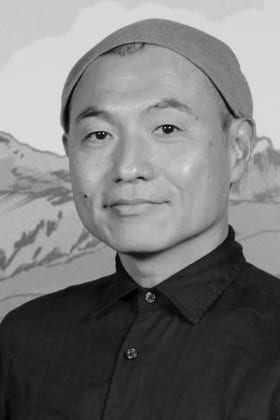
Masaaki Yuasa
“I just watched how he prepared his work,” says Yuasa of Shibayama. “When I first became an animator, I asked him several questions from time to time and the advice he gave still remains with me as a guide. I regret that I didn’t ask him more questions back then.”
Yuasa proved himself adept and rose through the studio’s ranks. He began building storyboards, writing scripts and learning how to direct. In 2004 he released his first full-length manga adaptation, Mind Game, a rapid fire, visually entrancing tale of a teenage milquetoast given a second chance to rescue his high school crush from gangsters.
“When I was a university student I thought I was someone special because I was able to draw,” says Yuasa. “[Then] I realized for the first time that there are many wonderful things in the world. I felt for the first time the world was interesting … With Mind Game, it depicts this young boy who used to be withdrawn, but started to come out of his shell … By opening up he realized the world was more interesting, and that was a reflection of how I used to feel.”
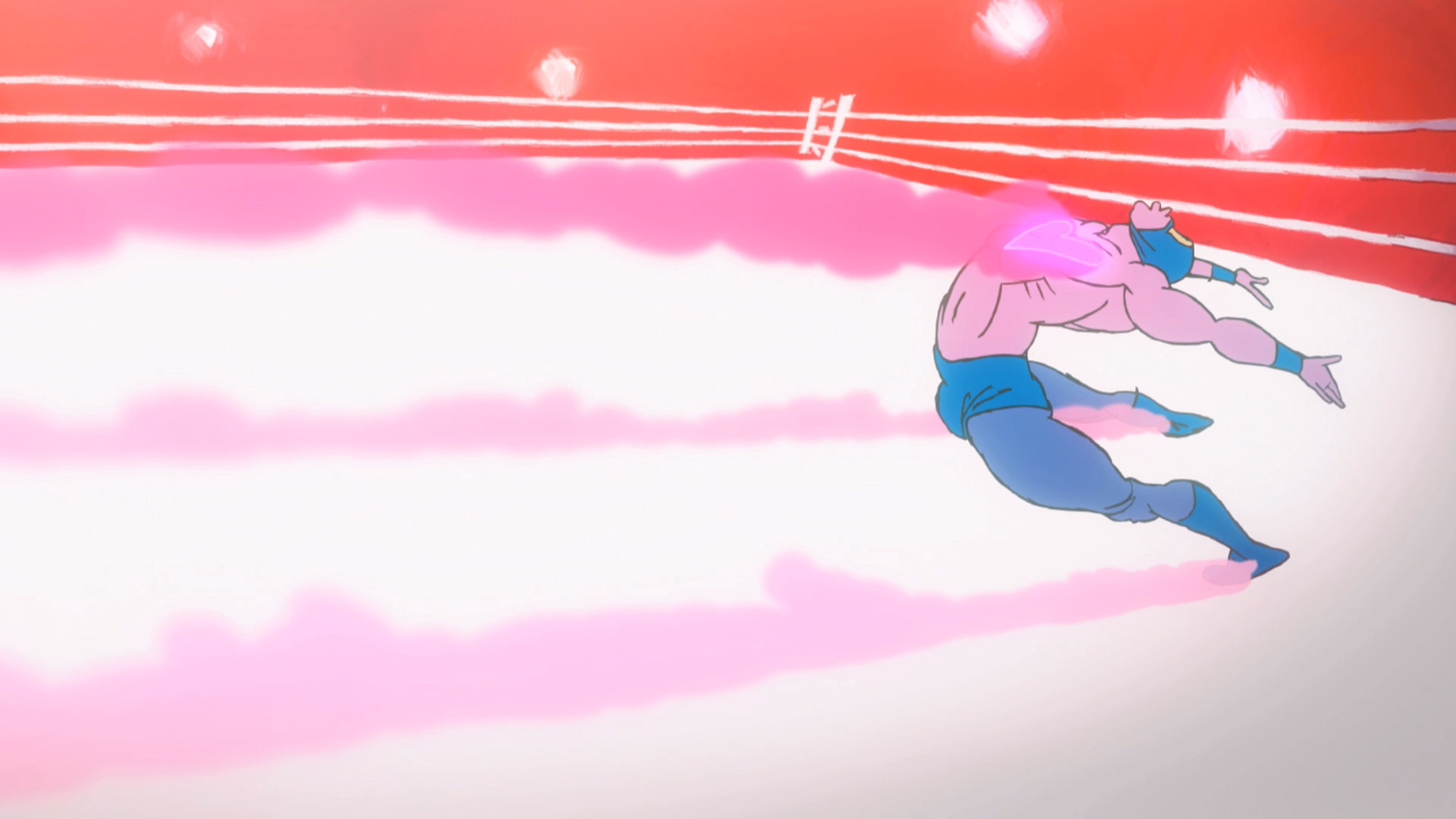
Kick-Heart, 2012
The film garnered Yuasa his first award, but fell short at the box office. Yuasa says while he received praise, others told him the film was too confusing or boring for mass audiences. He turned to working for television where he focused on developing stories and honing his craft. He churned out three successes on the small screen, peaking with 2010’s The Tatami Galaxy, the first TV anime to win grand prize at the Japan Media
Arts Festival.
In 2013 Yuasa released the short film Kick-Heart, the first successful anime project to use Kickstarter crowdfunding for financing. A year later he opened his studio, Science Saru. Ever since he has been able to let his creative impulses run wild.
“I want to depict freedom”
“I want to depict freedom,” says Yuasa. “I use a lot of my imagination. I am always trying to build what interests me into stories, and I keep thinking about that every day.”
Yuasa began 2017 by releasing his first original film, Lu Over the Wall. Marketed as a family movie, the story depicts a lonely teenager playing music in a small fishing town whose life is disrupted by an impish mermaid. For the film, Yuasa became the first Japanese film director since Hayao Miyazaki and Isao Takahata to win the Cristal Award at France’s Annecy International Animated Film Festival.
Within months Yuasa released a second feature, Night is Short, Walk On Girl, a
follow-up of sorts to The Tatami Galaxy as both are based off novels by Tomihiko Morimi, take place in Kyoto and involve the same characters. With more adult themes, this romantic comedy focuses on a university student who finally decides to confess his love to a fellow student during a long, insane night of drinking and partying.
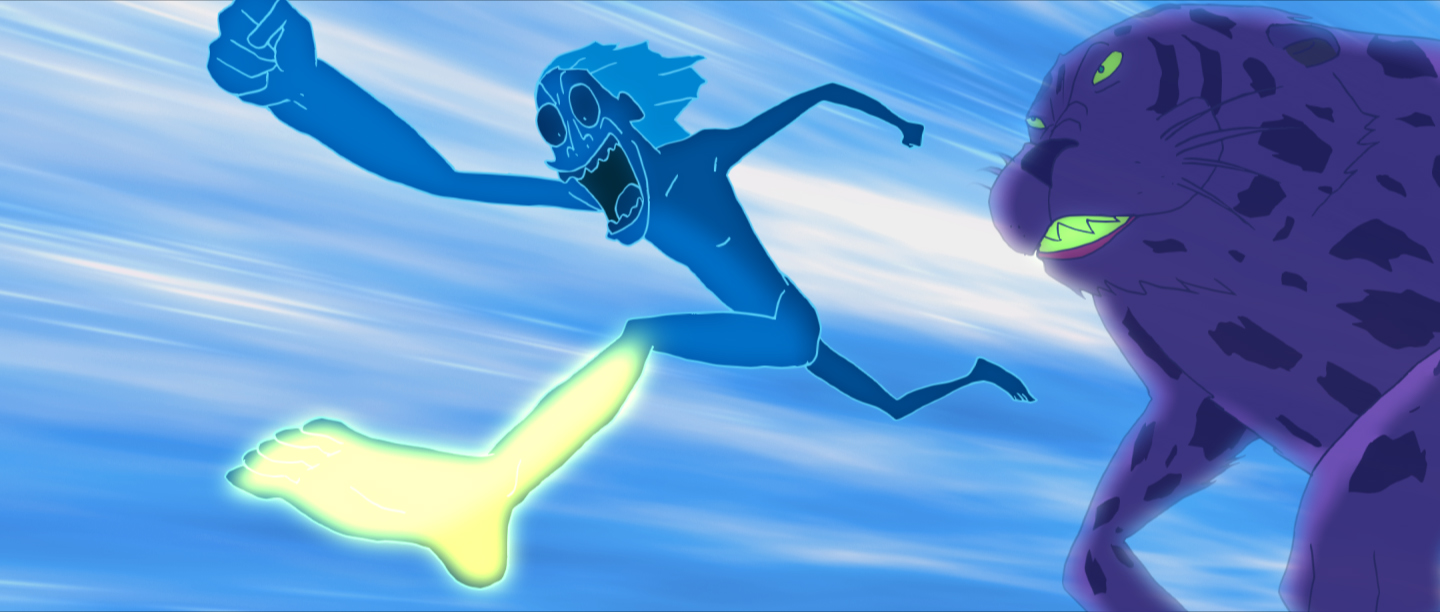
Mind Game, 2012
The film earned Yuasa the honor of being the first Japanese filmmaker to win Grand Prize for Features at the Ottawa International Animation Film Festival. Both Night is Short, Walk On Girl and Lu Over the Wall were released in US theaters, earning modest returns.
“I tried considering the international audience when I was working on Kick-Heart but at the end I felt the audiences themselves aren’t that different,” says Yuasa. “I am trying to depict people who are not bound by any sort of philosophy or habits. Most people can probably identify with someone similar.”
Not resting on his laurels, early this year Yuasa premiered Devilman Crybaby, a Netflix original series opening worldwide to rave reviews. Based on Go Nagai’s popular manga Devilman, this hyper-violent, highly sexualized, yet endearing tale portrays (another) sensitive young man, only this one must unite his soul with that of a demon to battle evil.
Yuasa was pleasantly surprised to see other artists creating concept art based on Devilman, and Mitsuoka Motors built the Devilman Orochi supercar, a model identical to the one driven by the series’ main character. “I am very grateful that I am able to influence that,” says Yuasa.
He will announce new projects soon, one of which is another original love story “with some tweaks” about a surfer girl and a fireman.
“I am always working on many projects at once,” says Yuasa, who doesn’t surf but would like to learn. “The basic theme that I focus on is that the world is an interesting place, and I want people to be aware that while we are living in the same place, we are experiencing life in a different way.”
The 31st Tokyo International Film Festival hosts world premiere of Asian Three-Fold Mirror 2018: Journey.
Aside from Masaaki Yuasa’s showcase at this year’s Tokyo International Film Festival, we also recommend the second installment of the omnibus film series, Asian Three-Fold Mirror 2018: Journey, which debuts on October 26 at TIFF.
The film, co-produced by TIFF and the Japan Foundation Asia Center, is directed by three Asian filmmakers, Degena Yun (China), Daishi Matsunaga (Japan) and Edwin (Indonesia). The project framework requires the directors to shoot on location in another Asian country and include a character connected to that country. Matsunaga, whose episode was filmed in Myanmar, is an up-and-coming director whose latest film, Hanalei Bay, will be released in Japan in October 2018.
TIFF takes place between October 25 and November 3. For more information see our event listing.
Image Credits: Mind Game, 2004, (c) 2004 MIND GAME Project; Lu Over the Wall, 2017, (c) 2017 Lu Film partners; The Night Is Short, Walk on Girl, 2017, (c) Tomihiko Morimi,KADOKAWA/NAKAME COMMITTEE; DEVILMAN crybaby, 2018, (c) Go Nagai-Devilman Crybaby Project; Adventure Time: Food Chain, 2014, TM & (c) 2018 Cartoon Network. A WarnerMedia Company. All Rights Reserved.; Kick-Heart, 2012, (c) 2012 Masaaki Yuasa, Production I.G; Space Dandy Episode 16: Slow and Steady Wins the Race, Baby, 2014, (c) 2014 BONES/Project SPACE DANDY; The Adventures of Buriburizaemon: The Lightning Chapter, 1995, (c) U/F・S・A・A; Genius Party: Happy Machine, 2007, (c) Genius Party

